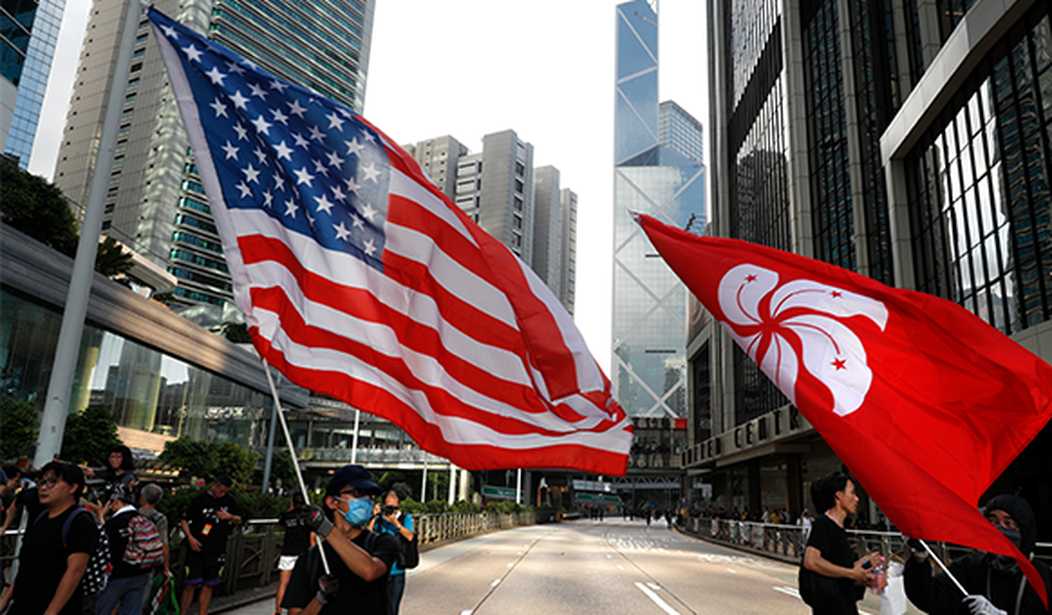The protests in Hong Kong are heartbreaking to witness. I recall the gloom that accompanied the handover of sovereignty ceremony in 1997. Prince Charles was there. So was Tony Blair. Only eight years had passed since the communist Chinese government had mowed down an estimated 10,000 democracy demonstrators in and around Tiananmen Square. And while China had since begun to liberalize its economy, the communist party maintained its totalitarian grip on political power, news and information, travel, family life, religion and the arts.
As the band played "God Save the Queen" for the last time, there were the usual soothing promises. According to the Sino-British Joint Declaration, dubbed "one country, two systems," Beijing pledged that Hong Kong would continue to enjoy the economic and political liberties it had known under British rule for 50 years. Hong Kong would remain free until at least 2047. Many imagined that by then, the communist government in Beijing would be gone.
The British administration had allowed Hong Kong to become one of the richest cities in the world. In 1997, Hong Kong's 6.4 million people were responsible for an economy that was one-fifth the size of mainland China's, with a population of 1.23 billion. Between 1984, when Britain announced its plan to turn over control to China, and 1997, about a million Hong Kong residents fled. They knew.
For a time, it seemed that China was keeping its word, but it was only a latency period. China had a motive to let Hong Kong prosper at first; it was a gold mine. But as the rest of China developed economically, its sheer size made Hong Kong's contribution less crucial. From a high of 27% of China's GDP in 1993, Hong Kong had fallen to only 2.9% in 2017. Freedom House downgraded Hong Kong's freedom score (100 = good, 0 = bad) from 68 in 2014 to 59 in 2019, reflecting China's suppression of speech and civil liberties. The violence against demonstrators these past weeks would presumably reduce the score even more dramatically.
Recommended
The protesters in the streets of Hong Kong have once again reminded us of the power of the U.S. example -- even as our leaders seem less committed to it. Hong Kongers carried American flags and sang "The Star-Spangled Banner." This is bittersweet. The students in Tiananmen Square in 1989 had fashioned a paper-mache Statue of Liberty. It swelled your heart -- until the brutal conclusion chilled your blood.
To hear Donald Trump tell it, the great challenge China represents to the United States is that they sell us too many products and buy too few of ours. His spokespeople add that China fails to abide by international trade rules and steals intellectual property. Those complaints are perfectly true (the latter two anyway), but the Trump administration's responses to these problems have been counterproductive.
Trump's first supposedly "tough on China" policy was to pull out of the Trans-Pacific Partnership. But that treaty would have disadvantaged China by strengthening U.S. trade with Pacific partners Japan, Singapore, Australia, New Zealand, Malaysia, Vietnam and others. With free (or freeish) trade agreements linking the majority of large economies around the globe, the U.S. would have then been in a better position to pressure China, in concert with other trading nations, to open its economy, stop stealing intellectual property and so on.
Instead, the administration imposed tariffs not just on China to punish it for cheating, but on our allies as well -- muddying the message and blunting the effect. When the United States declares that steel tariffs on Canada are a national security matter, it becomes a laughing stock and invites equally bad faith responses.
The challenge from China is more than merely a matter of steel, soybeans and solar panels. China is seeking to parlay its economic might into global influence. Its Belt and Road Initiative is designed to place China at the center of world commerce -- on China's terms. And its artificial intelligence research, particularly facial recognition, is being used to impose Orwellian control. China's "social credit" system already keeps tabs on Chinese citizens' daily activities and reading habits, and its exported products have been found to contain spying capacities. Big Brother's cameras are ubiquitous, and everything from daily step counts to religious interests are tracked and tabulated. As many as one million Uighurs have been herded into reeducation camps, while Tibetans, Kazakhs and other minorities are monitored and oppressed. China is exporting these technological tools of tyranny to Ethiopia, Venezuela and other repressive regimes.
Beijing has a bleak vision for the world's future that foresees economic expansion linking arms with technological repression. The U.S. has long shouldered the role of world leader upholding liberty. Sadly, our narrow focus on trade balances has miniatured the United States.
Mona Charen is a senior fellow at the Ethics and Public Policy Center. Her new book is "Sex Matters: How Modern Feminism Lost Touch with Science, Love, and Common Sense." To read features by other Creators Syndicate writers and cartoonists, visit the Creators Syndicate webpage at www.creators.com.

























Join the conversation as a VIP Member